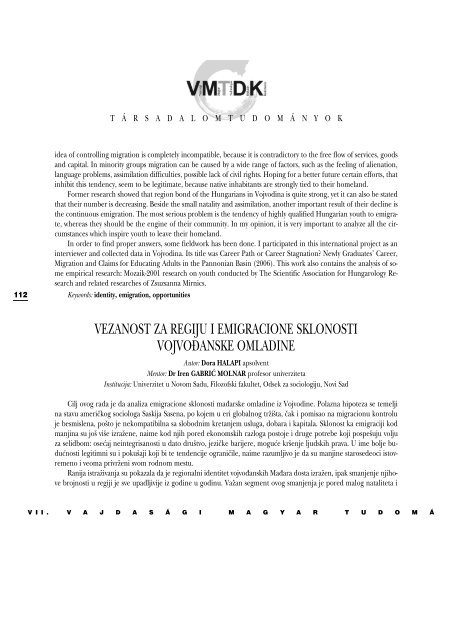Rezümékötet 2008. - vmtdk
Rezümékötet 2008. - vmtdk
Rezümékötet 2008. - vmtdk
Create successful ePaper yourself
Turn your PDF publications into a flip-book with our unique Google optimized e-Paper software.
112<br />
T Á R S A D A L O M T U D O M Á N Y O K<br />
idea of controlling migration is completely incompatible, because it is contradictory to the free flow of services, goods<br />
and capital. In minority groups migration can be caused by a wide range of factors, such as the feeling of alienation,<br />
language problems, assimilation difficulties, possible lack of civil rights. Hoping for a better future certain efforts, that<br />
inhibit this tendency, seem to be legitimate, because native inhabitants are strongly tied to their homeland.<br />
Former research showed that region bond of the Hungarians in Vojvodina is quite strong, yet it can also be stated<br />
that their number is decreasing. Beside the small natality and assimilation, another important result of their decline is<br />
the continuous emigration. The most serious problem is the tendency of highly qualified Hungarian youth to emigrate,<br />
whereas they should be the engine of their community. In my opinion, it is very important to analyze all the circumstances<br />
which inspire youth to leave their homeland.<br />
In order to find proper answers, some fieldwork has been done. I participated in this international project as an<br />
interviewer and collected data in Vojvodina. Its title was Career Path or Career Stagnation? Newly Graduates’ Career,<br />
Migration and Claims for Educating Adults in the Pannonian Basin (2006). This work also contains the analysis of some<br />
empirical research: Mozaik-2001 research on youth conducted by The Scientific Association for Hungarology Research<br />
and related researches of Zsuzsanna Mirnics.<br />
Keywords: identity, emigration, opportunities<br />
VEZANOST ZA REGIJU I EMIGRACIONE SKLONOSTI<br />
VOJVOÐANSKE OMLADINE<br />
Autor: Dora HALAPI apsolvent<br />
Mentor: Dr Iren GABRIÆ MOLNAR profesor univerziteta<br />
Institucija: Univerzitet u Novom Sadu, Filozofski fakultet, Odsek za sociologiju, Novi Sad<br />
Cilj ovog rada je da analiza emigracione sklonosti maðarske omladine iz Vojvodine. Polazna hipoteza se temelji<br />
na stavu amerièkog sociologa Saskija Sasena, po kojem u eri globalnog tržišta, èak i pomisao na migracionu kontrolu<br />
je besmislena, pošto je nekompatibilna sa slobodnim kretanjem usluga, dobara i kapitala. Sklonost ka emigraciji kod<br />
manjina su još više izražene, naime kod njih pored ekonomskih razloga postoje i druge potrebe koji pospešuju volju<br />
za selidbom: oseæaj neintegrisanosti u dato društvo, jezièke barijere, moguæe kršenje ljudskih prava. U ime bolje buduænosti<br />
legitimni su i pokušaji koji bi te tendencije ogranièile, naime razumljivo je da su manjine starosedeoci istovremeno<br />
i veoma privrženi svom rodnom mestu.<br />
Ranija istraživanja su pokazala da je regionalni identitet vojvoðanskih Maðara dosta izražen, ipak smanjenje njihove<br />
brojnosti u regiji je sve upadljivije iz godine u godinu. Važan segment ovog smanjenja je pored malog nataliteta i<br />
V I I . V A J D A S Á G I M A G Y A R T U D O M Á




